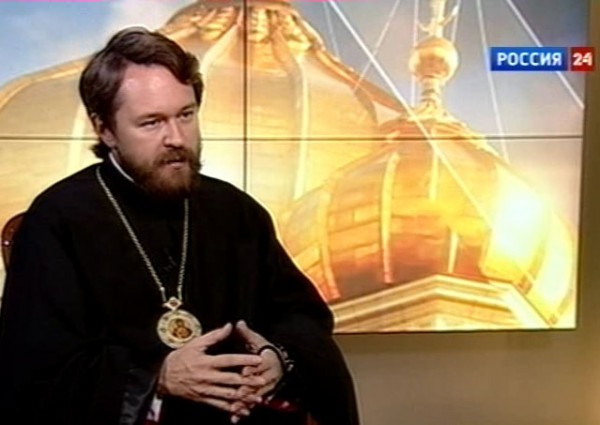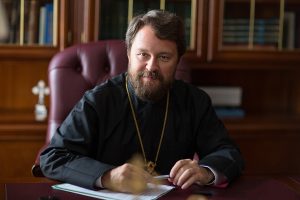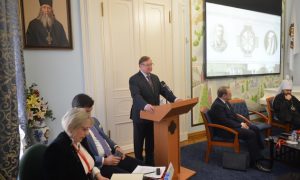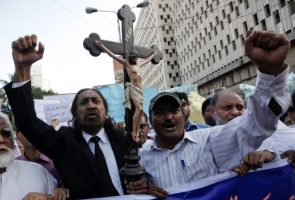Metropolitan Hilarion: Good afternoon, dear brothers and sisters. Christ is Risen! In these Paschal days, the mental eyes of many Orthodox faithful are directed to the Holy Land, the places where our Lord and Saviour Jesus Christ lived on earth. Today we will speak about the Holy Land, the Middle East and Palestine with the chairman of the Imperial Orthodox Palestine Society Sergey Stepashin. Good afternoon, Sergey Vadimovich.
S. Stepashin: Good afternoon, Your Eminence.
Metropolitan Hilarion: Christ is risen!
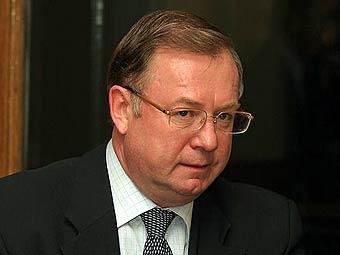 S. Stepashin: He is truly risen!
S. Stepashin: He is truly risen!
Among the main tasks of the Imperial Palestine Society is a serious, thorough and sometimes very dangerous work in the Middle East. I may start with Syria as the most problematic region today, as this country is very close to us in its Christian traditions. Today all the peoples in Syria are going through a very difficult period and Christians have proved to be in the most terrible situation.
Recently we have marked the centenary of the Armenian genocide. You know that the Armenian Church has canonized over a million citizens who were killed in the genocide. I believe today we have a full right to say that what is happening in the Middle East, too, is a Christian genocide.
The Imperial Orthodox Palestine Society is doing everything possible for it to give humanitarian aid to all the victims of this terrible tragedy. We have already sent some 12 cargoes to Syria. It is free aid; we have collected it throughout our Russian world. People gave out whatever they could. I would like to thank the Emergency Ministry and the Syrian Airlines for the assistance they gave.
Another important point is that the world community has at last begun speaking about the problems of the Middle East. Especially important today are statements made at international forums including in the UN about the discrimination and persecution against Christians In spite of the fact that international organizations have different attitudes to Russia, we have been heard for the first time and not only on the Geneva and New York platforms. For the first time in the history of the UN Security Council it was on our initiative jointly with the Minister of Foreign Affairs Sergey Lavrov that the problem of the protection of Christianity and the situation of Christians in the Middle East was raised at a meeting of the UN Security Council.
Metropolitan Hilarion: We have been working together with you in this area for many years now. Only a few years ago when we spoke out loud on behalf of our Church about what was happening to Christians in the Middle East, the West preferred not to hear us. I remember speaking at a meeting of the UN Third Committee in New York in which about 150 countries were represented. I cited statistics and facts but got full silence in response and a very clear impression that the Western world did not wish to hear about the tragedy of Christians unfolding before our eyes.
Yes, something has begun really changing of late, and if before only Islamophobia and anti-Semitism were discussed and resolutions only this issue were adopted at international platforms, now the persecution against Christians is discussed for the first time. But it began only after in several Middle East countries the so-called ‘Arab Spring’, inspired not from within but from outside the Arab world, led in fact to the extermination of Christianity.
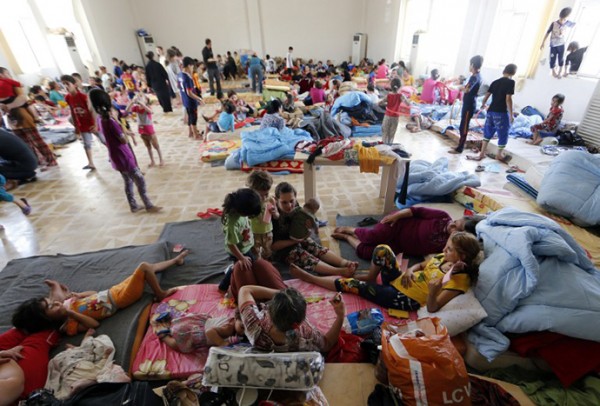
Iraqi Christian families fleeing the violence in the village of Qaraqush and Bartala, about 30 kms east of the northern province of Nineveh, are pictured at a community center in the Kurdish city of Arbil in Iraq’s autonomous Kurdistan region, on June 27, 2014. Iraq’s top Shiite cleric urged the country’s fractious political leaders to unite and form a government to help see off advances by Sunni militants who have overrun swathes of territory. AFP PHOTO/KARIM SAHIB
Only a little over ten years ago in Iraq there were about one million and a half Christians. Now nobody knows exactly how many of them are left there. Various estimates are given from one to four hundred thousand. Most of the Iraqi Christian were either killed or had to leave their homeland. There are almost no Christians left in Libya, where there used to be about one hundred thousand. Tragic events took place for several years in Egypt. Now we can see what has been going in Syria for already several years, where the so-called opposition (actually uncontrolled bands of militants) with the support of Western countries have systematically wiped out the Christian population and the Christian heritage.
All this is taking place before the eyes of the civilized world. And only after videos of mass executions appeared in the Internet, the persecution against Christians began to be voiced at last in Europe and generally in the West. By that time however, dozens and hundreds of people had been already killed and millions had become roofless. And we can no longer wait and limit ourselves only to talks, for resolute actions are needed here and now.
The humanitarian aid given by the Imperial Orthodox Palestine Society in the Middle East to people who have found themselves in the situation of humanitarian disaster. And the 12 humanitarian convoys sent to Syria at the Society’s initiative have helped many people, not only Christians but Muslims as well.
S. Stepashin: There is still another task before us, which, to be frank, is seriously complicated by the war situation. You know that the decision was made to build a Russian school in Damascus, the first one after 1914. There is an agreement with the leaders of the country and there are resources, but we will see how the situation will develop.
I should say that last year the Syrian leaders decided (as was announced during a meeting with President Assad) to introduce the compulsory study of the Russian language for all the Syrian schoolchildren. I believe such support is very important too. Today we are engaged in broadening the possibilities for Syrian young people to study in our universities. Immediately upon my arrival from Syria, I had meetings with both the minister of education and leaders of major universities including the rector of Moscow University. I believe it is very important.
I would like to once again emphasize however that it is important that we are heard now. It is important that our voice should be increasingly heard at international arenas in the UN, Geneva, New York, Moscow and in the Middle East. In this respect, I would like to thank our Russian Orthodox Church, with which our Society is inseparable, and the Patriarch of Antioch, a courageous man whose brother was captured by bandits and whose fate is still unknown.
It is high time for us all, not only Orthodox people, not only Christians, but all who love their land, who love peace and respect people, to think over these problems.
Metropolitan Hilarion: A few years ago I was asked to receive a delegation of the so-called Syrian opposition, though it is not the Church’s business of course to interfere in political conflicts. I met with these people and had a talk with them. But for a whole hour I could not see who they actually represent and what they can influence. During a single talk I heard various names and the names of various organizations. Now they said they were not linked with the army in any way, now they were a political wing of the so-called Syrian Liberation Army. All in all, it was difficult to understand.
It seems to me that now in the West there is an understanding that it is too risky to stake on little-controllable people. Actually, what is the result of the support that was given to extremist forces in the Middle East? The result is that terrorism and extremist continue growing and spreading in the Middle East like a plague. And the Western world no longer knows what to do.
Not long ago a resolution was adopted concerning exactly the situation of Christians. It was initiated by Russia, the Vatican and Lebanon. It is a timely resolution but it is time to move from words to deeds. We cannot simply limit ourselves to resolutions and a statement of the fact that it is really a Christian genocide. It is one thing to reflect on centenary-old events and it is quite another thing to see a tragedy unfolding before our own eyes. It is difficult to believe that Western powers, who posses powerful arms and a powerful system of surveillance and intelligence, have not enough resources to stop this ‘black plague’.
S. Stepashin: An example from another plane. This year we mark the 70th anniversary of the Victory of the Soviet people in the Great Patriotic War. Let us remember who it were who led Hitler to power – the same West, the same North American states. Until the Nazi infection had struck the whole Europe, the efforts to unite failed, but eventually they succeeded.
What is going on in Saudi Arabia and Yemen? I do not at all welcome their actions from the point of view of a possible result, but as soon a tight situation developed at the border they immediately united and now have the full support including financial from the USA.
You are quite right – we should work together, first of all, the European countries – France, Germany, Italy, who are the destination of an enormous number of refugees including from Ethiopia. The situation has already spread to it. The military component should be put in action at some time, for sure under a resolution of the UN Security Council, but the most important thing is to stop the support, as it is evident indeed where money, arms and military specialists come from. I have an experience of the first Chechen campaign. I fought in it, and we know who supported it – the same people who, later in 2001, hit the towers in New York.
I would like to stress once again that today we in our focus on Ukraine – our pain, our common disaster because ours are there too – should not ignore the terrible tragedy, the plague that can sweep over the whole world in the 21st century. It is really a satanic plague, I fully agree with you.
Metropolitan Hilarion: That is why the consolidated action of the whole civilized world is so important today.
S. Stepashin: Yes, you met with the Pope of Rome, and our Society’s leader made an official visit to Rome. The Pope supported us both officially and publicly. It is also a good precedent.
Metropolitan Hilarion: The stand taken by the Holy See on such international problems as Ukraine and the Middle East is very close to ours. And here we have no differences in essence.
We are well aware that if the whole world now fails to unite against this new terrible epidemic, the consequences may be irretrievable. First, no Christians may be left in the Middle East. And this will be a real civilizational geopolitical tragedy because the Middle East is the cradle of Christianity, the place where Christians have lived for two thousand years. Secondly, it will open a further access to the whole world for the forces which have already manifested their aggressiveness. I believe each country should be concerned by it because sooner or later it will come to its borders too.
S. Stepashin: Quite right. Perhaps some will disagree with me but Russia is a country which will cope. We are accustomed to cope. We have endured the Caucasus tragedy and held out. But Western Europe is not at all ready for it. People are too well-off there, too relaxed.
I think the awareness of it is coming. First of all in France, where there is now a fairly large number of people who have escaped from other countries, who live and work there and who hold views quite different from Christian ones – just civilized people. You are absolutely right.
We should always seek points of contact rather than division.
Metropolitan Hilarion: Quite right.
S. Stepashin: It is exactly what can bring us seriously together at this stage. It is not accidental that the theme of today’s program in these Paschal days is a serious problem in our world which should be resolved.
Metropolitan Hilarion: Thank you very much, Sergey Vadimovich, for all that you do in the Imperial Orthodox Palestine Society to relieve the situation of those who have found themselves in a critical situation, in the situation of humanitarian disaster in the Middle East.












